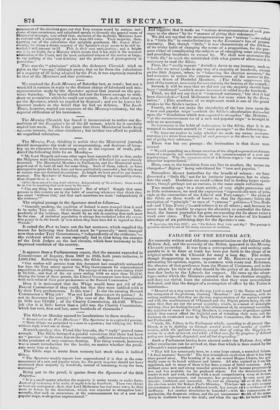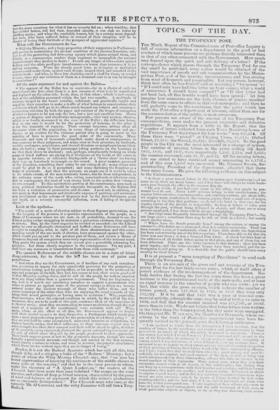FAILURE OF THE REFORM ACT.
AN earnestly written and elaborate communication on the failure of the Reform Act, and the necessity of the Ballot, appeared in the Morning Chronicle yesterday. It was from a correspondent ; and nothing corn. parable to it in force or truth has been put forth in the shape of an original article in the Chronicle for many a long day. The writer, though disapproving in some respects of Mr. ROEBUCK'S manner of advocating his opinion, regrets, in common with every real Reformer, the absence of that gentleman from the House of Commons, and in the main adopts his view of what should be the policy of an Administra- tion that looks to the Liberals for support. He sums up the advan- tages under which the Ministers entered on the late election struggle; and does not shrink from the admission that they were nevertheless defeated, and that the danger of a resumption of office by the Tories is imminent- " Mounted on a step nearer to the top, (and so near !) the Tories will beard the occupants of time platform, shouting Reaction ! ' and assuming, with in. suiting confidence, that they are the true representation of the nation's opinion and will, the machinations of O'Connell and the Popish priests being the sole cause that they are not the actual majority ; which, in a mood of mixed glee and fury, they are looking forward to the attainment of, by occasional vacancies, the rejection of some of the Whig Members, in consequence of petitions against which they cannot afford the frightful cost of defending their seats, and the decisions on scrutinized cases by 'fury Election Committees, like those of the last Parliament. "‘ Such, Mr. Editor, is the Parliament which, according to all present like- lihood, is to be fighting on through wasted weeks and months of another session, while the national business, except that of voting the Supplies, re• mains in a state of arrest, and while al that care for the progress of Liberal policy are indignant, disgusted, and all but desponding."
Such a Parliament having been elected under the Reform Act, what other conclusion can be arrived at, than that which is thus stated by the Chronicle's correspondent ?
"That bill has notoriously been, to a very large extent, a wretched failure. A final measure,' forsooth ! '[lie first triumphant exultation about it has long since passed away. The boasting of it, as our second Magna Charta, has gra- dually come to be beard seldomer and fainter. All who rejoiced in it arc dis- appointed, and to ninny of them it has been a cause of bitter vexation. And, without some new and strong remedial provision, it will become progressively less and less available for its professed object. For the determination to render it null and void, working with a most comprehensive array of devices, machinery, management, and resources, has progressive) s ha :ome more eye- ternatic, confident, and successful. We saw an alarming fail ire of the bill in the election under Sir Robert Peel's Ministry. This last t'ect in, with soloing circumstances in favour of a different result, has crimple ed t to evidence of its inefficacy. Let another dissolution be hazarded !—with thu consummate.or- ganizatiun, the desperate ardour, and the yet unconsumed width of the rem cracy iu readiness to meet the trial; and when the apsctit: for bribes will be siose•-•—•-• but the more voracious for what it has so recently fed on ; when timidity, that has yielded before, will feel that, degraded already, it can sink no lower by yielding again; and when the resolutely honest, but in a certain sense depend. yet men, who have suffered before in reward of their integrity, will be in danger of losing their fortitude at the prospect of aggravated injuries." What will the Government do ?—..
» Will the Ministry, and a large proportion of their supporters in Parliament, still persist in maintaining the present condition of the elective:franchise, sub-
ject to all the perverting and destroying agency which glares around them, and which, as a consequence, renders them impotent to accomplish the national improvements they profess to desire To talk any longer of laws—laws against bribery and the other profligate interferences—is worse than nonsense, it is in- sulting nonsense. There are already penal laws, as stringent as multiplied clauses could make them, against such doings, heaped thick and manifold in the statute-book : and who, in these late elections, cared a chaff for them, or needed to care, since not one violation of them in a thousand ever is or can be brought to conviction ? " Of the main argument for and against the Ballot- » The opposer of the Ballot has to maintain—for in a choice of evils we ime.t choose the less—that there is a less amount of what is to be reprobated and deplored on the other side. Look, then, at that other ; which is just saying, look at the exhibition presented within the last two months. A multitude of citizens, steeped in the basest venality, sedulously and practically taught and urged by their superiors to make a traffic of what belongs to conscientious duty —a lesoin which will go in its effects much beyond one subject and occasion— a conscious violation by both the payer and receiver of the wages of corruption of what is known to be not only the law, but a just and excellent law. Hence a system of disguise and clandestine management,—that very secrecy, observe, whfcli is so loudly denounced in the case of the Ballot ; the difference being,, that in one case it would be for the protection of honesty, in the other it is fur the impunity of roguery. These corrupt largesses, setting afloat all the coarse vices of the population, in every shape of intemperance and pro. fligaev, as an ovation for the virtuous patriot who is going to assist in the enacting of laws to preserve the good order of the community. Many thousands and tens of thousands compelled, under dread of consequences, to vote contrary to their judgment, and many even to their promises, by landlords, wealthy customers, magistrates, and clerical dictators or sycophants (most likely they are both); some of these personages taking positions on the hustings to see that their slaves be obedient ; and, perhaps, complacently looking on while gangs of hired ruffians are plying their bludgeons on the heads of the voters in an opposite interest, or volunteer blackguards of a 'better class' are forcing their way on horseback to trample on the crowd. A great number, possessed of the franchise, consulting their safety by not voting at all ; many others who would lie glad to do so if permitted; and many declining the franchise as a badge of servitude. And then the account, an ample one if it could be taken in its whole extent, of the men resolutely honest, but far from independent, in the ordinary sense of the word, who, voting conscientiously at whatever cost, find in consequence the need of very strong faith in the maxim that 'virtue is its own reward.' To this meritorious portion of the constituency, men such as every political institution should be especially favourable to, the Reform Bill Las' as leen a visitation of persecution and disaster. I need not, in addition, ad- vert again to that harassment and intolerable expense of petitions and scrutinies, now proclaimed as the scheme of desperate war by the Anti-Reformers, great and small, as a severely revengeful infliction, even if failing of its specific object."
Look at the upshot-
" The result of a mode of election subject to these flagrant perversions, true to the iniquity of the process, is a spurious representation of the people, in a House of Commons where we are now, in all probability, doomed to see the Liberal policy rather struggling to maintain a precarious existence than aspiring to victory. But, let the worst auguries be verified or exceeded—let the Liberal policy be ever so effectually obstructed and baffied—those Reformers will have no right to complain, who, in sight of all these abominations and this corre- sponding result of the one mode of election, have pronounced against the other, which would put an end to the greatest part of them, and return a House of Commons beyond all comparison more truly representative of the national mind. They prefer the system which they see cannot give a powerfully reforming Le- gislature. Let them silently acquiesce in the consequences. For my part, I shall hear any murmurs or lamentations from them with contempt." The earnest Reformers of the middle classes are in a state of bitter disappointment, for to them the bill has been one of pains and penalties- " And when they see the Government, as if heedless of any such considera- tion, persisting to oppose the only conceivable provision for the protection of conscientious voting, and for giving effect, as far as possible, to the professed de- sign and pi iuciple of the bill, they feel, but regret to feel, their rearm good-will to that Ministry cooling down, and its call on the people for zealous exertion to be any thing rather than a generous requirement. They are beginning to say, how is it worth our sacrificing ourselves to support a government who refuse to protect us against some ot the grossest wrongs in doing so ; wrongs endured under the insolent triumph of those who inflict them, and the coarse contempt of the other class who are enjoying the venal rewards of vio- lating their moral principles, or having none to maintain ? Why, especially, these exertions, when the exposed condition in which, by the will of the Go- vernment, they are to be made at this cost, condemns them at the sometime to le.thrown aztlly ; since they are unavailing to secure an election though the real of a majority of the constituency were certainly with us? Why, again, when, as the effect of all this, the Government appear in league mil* their medal enemies to deny themselves a Parliament which would give them tt most preponderating power for the prosecution of a Liberal policy ? If they are withheld by some unexplained, unavowed interests or obligations, let them at least be aware, that their adherence to those interests cannot now be taken to imply less than their consent and their trill to stand in ellice, destitute of the power to carry vigorously forward the great national improvements forrite wake of which alone. they are by the people preferred to their opponents. Their frank support given at lust to the protective measure, though not made formally a government measure, and though not carried in the first instance, would greatly conduce to retain, and even to recover, the popular attachment, tilich there are too evident signs they are in danger of losing." Reader, it is not the Radical Spectator which has said all this, true though it be, aiid a stinging rebuke of the " Reform " Ministry; but a writer of whom the Whig ..1forning Chronicle says, that "no man has better opportunities of knowing the sentimeuts of the middle classes in many parts of the country," and that he is tile saline person to whom, tinder the signature of " A Quiet Looker-on," the readers of the Chronicle have been more than once indebted " for essays on the some question, and others of deep political interest, characterized by the grasp 01 mind and fairness of argument for which this writer's productions are so eminently distinguished." The Chronicle must take care, or the sarcastic Mr. O'CONNELL and the witty Examiner will call him a Tory. Radical. .1., •



























 Previous page
Previous page